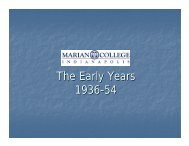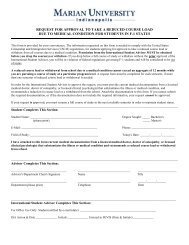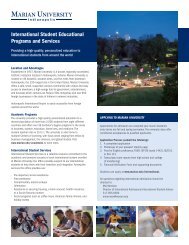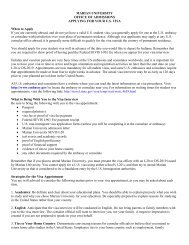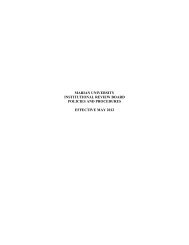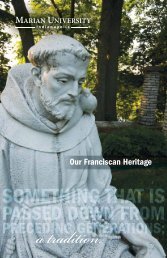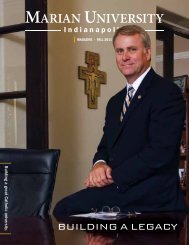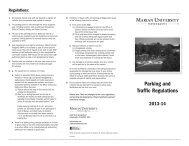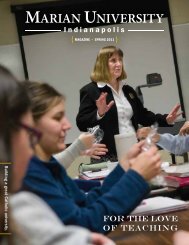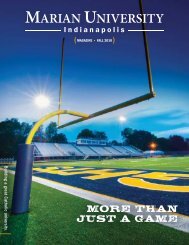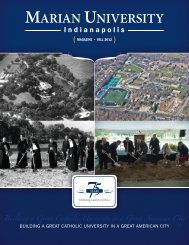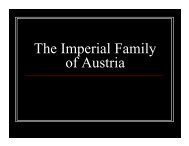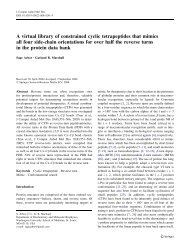2009-11 Marian University Course Catalog, fall 2010 edition
2009-11 Marian University Course Catalog, fall 2010 edition
2009-11 Marian University Course Catalog, fall 2010 edition
You also want an ePaper? Increase the reach of your titles
YUMPU automatically turns print PDFs into web optimized ePapers that Google loves.
THL 176/177, 276/277, 376/377<br />
Internship in Ministry 0.5 credit<br />
Pastoral Leadership majors are expected to participate in a<br />
formal internship for no less than two hours each week<br />
throughout the first three years. Internship may be waived<br />
for persons concurrently working 10 or more hours in a<br />
formal ministry role. This course does not apply toward the<br />
general education requirement in the theological and<br />
philosophical reasoning category. (SEM)<br />
THL 205<br />
Studies in Jesus the Christ 3 credits<br />
Exploration of the various portraits of Jesus found in the<br />
Gospels and the writings of Paul. One objective is to begin to<br />
formulate one’s own Christology in the light of such key<br />
concepts as Incarnation, Passion, and Resurrection. This<br />
course partially fulfills the general education requirement in<br />
the theological and philosophical reasoning category. (2SO)<br />
THL 208<br />
The Church 3 credits<br />
The nature and structure of the Church. A consideration of<br />
the images of the Church in the Scriptures provides the<br />
context for the study of later controversies, theologies, and<br />
declarations by popes and church councils. A thorough study<br />
of the documents of Vatican Council II with consideration to<br />
their ecumenical significance. Study of contemporary Roman<br />
Catholic theologies of the Church. This course partially fulfills<br />
the general education requirement in the theological and<br />
philosophical reasoning category. (2FO)<br />
THL 216<br />
Moral Issues 3 credits<br />
A study of moral theology in relationship to current moral<br />
issues with a particular emphasis on the dignity of the human<br />
person, conscience formation, and the struggle to live<br />
authentically in our culture. Moral issues concentrate on a<br />
consistent ethic of life encompassing the personal, social,<br />
economic, and ecological dimensions. This course partially<br />
fulfills the general education requirement in the theological<br />
and philosophical reasoning category. (SEM)<br />
THL 226<br />
Old Testament 3 credits<br />
A study of the literature of the Old Testament with particular<br />
emphasis on the gradual development of the Biblical nation<br />
of Israel and its theology. Texts are discussed in light of their<br />
historical settings and as their messages apply today. This<br />
course partially fulfills the general education requirement for<br />
a second theology course. (FAL)<br />
THL 228<br />
New Testament 3 credits<br />
A study of the literature of the New Testament. The course<br />
focuses on the variety of ways in which the message of Jesus<br />
was interpreted by the early Christian communities. This<br />
course partially fulfills the general education requirement in<br />
the theological and philosophical reasoning category. (SPR)<br />
THL 232<br />
History of Christian Thought 3 credits<br />
A study of how the Christian community has attempted to<br />
articulate its belief through the thought patterns current at<br />
various moments of its history. Specifically stresses the<br />
patristic, scholastic, and reformation periods, with application<br />
to contemporary issues. This course partially fulfills the<br />
general education requirement in the theological and<br />
philosophical reasoning category. (2SE)<br />
THL 236<br />
Liturgy and Spirituality 3 credits<br />
A study of the nature and use of symbol in worship and<br />
sacraments. The course is directed toward understanding<br />
liturgy and sacraments as expressions of the heart of the<br />
Gospel message—healing, reconciliation, entering into the<br />
new life and mission of Jesus. A unit of this course deals with<br />
classical and contemporary spirituality. This course partially<br />
fulfills the general education requirement in the theological<br />
and philosophical reasoning category. (2SE)<br />
THL 241<br />
Introduction to the Art<br />
of Spiritual Direction 3 credits<br />
Prerequisite: This course is offered externally through the<br />
Benedict Inn and requires acceptance by the appropriate<br />
director. A course in spiritual formation and the first step<br />
toward an internship in spiritual direction. As such, it has a<br />
twofold goal and structure. Class presentations are intended<br />
to introduce and explore the history of spirituality, ways of<br />
praying, faith development, and the meaning of spiritual<br />
direction as reflected in the Christian tradition. The<br />
corresponding group sessions focus on each person’s spiritual<br />
journey by actual time spent praying together and processing<br />
the material presented in the input sessions through group<br />
discussion. This course does not apply toward the general<br />
education requirement in the theological and philosophical<br />
reasoning category. (2FE)<br />
THL 242<br />
The Spiritual Journey 3 credits<br />
Prerequisite: 241. The second course of a four semester<br />
Spiritual Direction Internship Program. The class<br />
presentations are intended to introduce and explore the<br />
spiritual journey through the eyes of the Desert<br />
Fathers/Mothers, Julian of Norwich, Teresa of Avila, and John<br />
of the Cross. The corresponding group sessions are the<br />
practicum component of the internship. This course is offered<br />
externally through the Benedict Inn. This course does not<br />
apply toward the general education requirement in the<br />
theological and philosophical reasoning category. (2SO)<br />
THL 258<br />
Asian Religions 3 credits<br />
A study of the major traditional Asian religions of India, China,<br />
and Japan as seen in their historical settings. Emphasis is<br />
upon Hinduism, Buddhism, Confucianism, Taoism, Shinto, and<br />
132



